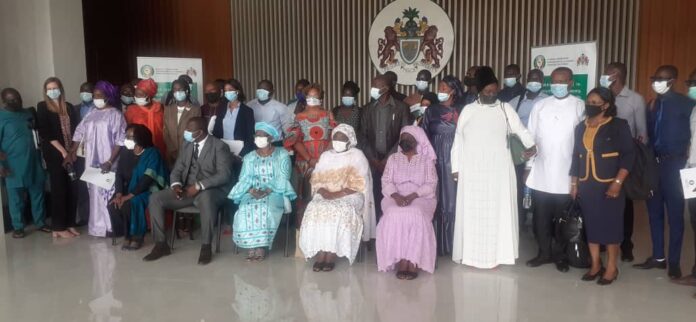By Nelson Manneh
The National Agency for Trafficking in Persons in partnership with the ECOWAS permanent mission has on Tuesday 13th July 2021 commenced training of stakeholders on Integrated In –Country Advocacy and Implementation of ECOWAS Gender Base Violence and Child Rights Texts in the context of COVID-19 Pandemic.
The prevailing realities in West Africa with regards to Human Security and Protection, specifically include weaknesses in the rule of law and observance of fundamental human rights, general weakness in the administrative capacities of Member States, weaknesses in child protection and social protection systems, the prevalence of conflicts and humanitarian emergencies inclusive of natural disasters and health pandemics such as the current COVID-19 pandemic and the Ebola Virus Disease of 2014. The West African region is also subject to substantial migration movements. Statistics from UNHCR 2017 shows that between 2% and 3% of the West African population is involved in mobility – more than 8.66 million individuals. Armed conflicts, disasters, and poverty are the largest contributors to the high level of migration in the ECOWAS Region.
Dr. Isatou Touray the Vice President of the Gambia said The Gambia was one of the original signatories to the ECOWAS Treaty of 1975 and continues to perform its role and live up to its obligations under the Revised Treaty and various enabling instruments of the Treaty. These include the ECOWAS Protocol Relating to the Mechanism for Conflict Prevention, Management, Resolution, Peace-keeping and Security-1999.
“Articles 2, 3, 16, 40, 42 and 46, focused on the realization of the basic principle of protection of fundamental human rights and freedoms and the observance of the rules of international humanitarian laws are reflective of the aspirations set out clearly in The Gambian Constitution and continue to provide guiding inspiration.
The provisions of the Sections also cover the guarantee of children’s rights, prescription for special laws against child trafficking and child prostitution and laws and regulations on child labour, among others. The commitment of The Gambia to meeting these obligations are revealed in, for example, the creation of NAATIP to combat human trafficking,” she said.
Touray said according to The Network Against Gender-based Violence, an organization that has been working on establishing One-Stop Centers in the country, it recorded 941 cases of sexual violence between 2014 and 2018, 88% of whom were children. Social norms and values, including a culture of silence, pose a big challenge to the consistency of child protection services and weaken the child protection system. “It is also reported by UNICEF that, according to 2018 Multi-Indicator Cluster Survey (MICS), 50.6% of girls between o to 14 years old, and 27.3 of girls between o and 4 years old have undergone female genital mutilation, cutting (FGM/C).”
Ms. Vabah Gayflor the ECOWAS Resident Representative in The Gambia said since the outbreak of the COVID-19 Pandemic, emerging data and reports have shown an increase in different types of violence against women and children in The Gambia as well as in other parts of the region.





















